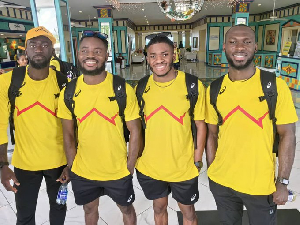Opinions of Monday, 30 January 2012
Columnist: The Finder newspaper
MTN, GAVET and the Stranger from Naija
Savannah View: MTN, GAVET and the Stranger from Naija
It used to be a luxury, a status symbol. But times have changed. It is now a necessity.
Almost all categories of persons in Ghana today own cell phones. The business executive owns one, and so does the trader at Makola Market. The teacher owns a cell phone, and the head porter does not want to be outpaced by the truck pusher in the technological advancement that has swept across the nation like wild harmattan fire in savanna grassland.
The type, size, function and price of phones vary significantly. But the value, we often say, is the same; they can all make and receive calls. But a few years ago in this country, mobile phones were a preserve of people in highest social class. Mobile phone companies were still struggling to come to terms with what actually suited the word “mobile phone.”
As a result, a mobile phone in those days could was big as a four-battery tape and weighed many kilos. Some were indeed, immobile cordless phones. As with many products in Ghana, they were nicknamed “Gomoa bankye” because they were actually about the size of the “gargantuan” cassava of Gomoa in the Central Region. That notwithstanding, having access to a cell phone was extremely difficult. What was even more difficult was getting a service number. Some pioneer mobile phone users in Ghana bought their mobile phone chips as high as GH¢300 or more, and sometimes through “connection men” in the black market. Even those were the lucky ones. Some had to abandon the idea of owning cell phones after frustratingly fruitless attempts to get their numbers.
Ghana Telecom enjoyed complete monopoly in the industry, but like many incompetent people dubiously chosen to manage state-owned companies, the bunch of dudes called management at GT were preoccupied with what would fatten their accounts. They cared less about innovation and expansion and did not seem to think about competition. Even when competitors came in, they and their foreign partners brought in by government, were not wise enough to stand up to the new challenge.
Don’t think I’m being too harsh. I get angry when I think about how that strategic national asset was sold off cheaply like a plate of konkonte and ayooyo soup. Ghana Telecom had masts in almost every district capital. But they would wait for the new entrants to acquire land, pay compensation and royalties, spend months to erect masts and start operation before Ghana Telecom would extend their services to those communities.
However, it is often the first network to get to a place that captures the majority of the market shares. That was what happened in Kete-Krachi when then Areeba and now MTN extended its services to the district in early 2006. Ghana Telecome already had a mast there but they waited for MTN to take over before they came in. Management of GT and their collaborators should have been jailed. There could not be a worse offence of causing financial loss to the state. But all that is now history. Today, only a few people remember that a cell phone was once a luxury and a status symbol in Ghana, thanks to competition. In fact, if there is ever an evidence of how a free market economy can work to the benefit of consumers, then it is Ghana’s telecommunication industry. The fierce battle for subscribers started when the monopoly was broken and has taken different forms to date.
First was the extension of service to parts of the country which were hitherto out of coverage area. Then when almost all the major network registered their presence in all the major towns in the ten regions of the country, the network operators resorted to massive advertisement in both the print and electronic media. They have, in a way, helped to enhance media freedom through funding in the form of adverts and sponsorship of programmes. As if the media was not enough, they resorted to branding and painting of houses and shops in their colours, especially communities along major road networks in the country. When all of them had good doses of the branding exercise, promotion after promotion was announced, almost on weekly basis until quite recently, the mobile network operators started what subscribers have been waiting for all these years – significant reduction in tariffs.
Vodafone Ghana decided to reduce its call tariffs from 14 pesewas to 8 pesewas on condition that subscribers first register with a code. Barely forty-eight hours after this, Zain (now Airtel) also announced an unconditional reduction in tariffs from 14 pesewas to 8 pesewas. MTN could not be left out so with every recharge one made, one had some free airtime to call a particular number. MTN then moved on to their highly advertised call plans, which did not seem to catch on well with subscribers. Tigo doubled or triples the talk time with every recharge one made and would later run promotion upon promotion that made their charges cheaper. Now they tell us they charge the lowest rate of 3 pesewas. But that is only from a Tigo number to another Tigo number. With regard to tariffs, however, it as if Vodafone and Airtel’s fixed rates across board that have caught on well with subscribers.
But the competition promises to be keener with the entry of the Nigerian giant, Globacom. There have been weird tales of how some powerful forces have tried to frustrate the entry of Glo. Whether it is true or not, Glo has not escaped the target of ads targeted at competing brands in the mobile telecommunication industry.
Tigo’s, award-winning ad, “Honey Couchie Couchie” seemed set the tone for other companies whose ads indirectly targeted competitors. The most popular mobile ad in 2011 was MTN’s GAVET. The acronym, some have said, stands for Glo, Airtel, Vodafone, Espresso and Tigo. Airtel was the first to respond with an ad telling subscribers not to buy into the lies being spread. This was in the ad that said Airtel was in Buipe and other areas. Now, Rafiq Salam is helping spread that message.
Ghanaians stand to enjoy as Glo is urging us to “rule our world” by reserving numbers of our choice. This is indeed, an interesting development resulting from the interplay of market forces. The major problem with the mobile operators, however, still remains poor quality of service.
There is still more to be done if these mobile phone operators are to receive thumbs up from Kofi Kapito and his Consumer Protection Agency. Subscribers are still told that a particular number is switched off or out of coverage area, when that phone is actually on and is a few inches from the telecommunication mast of that network. Now some of them say emphatically that the phone is switched off because they claim they have covered every cave in every hamlet of Mother Ghana. Ridiculous!
Relationships are destroyed and there is a growing mistrust in marriages due to network problems. If a man in Bongo in the Upper East Region places a free night call to his wife in Kete-Krachi in the Volta Region to discuss an important issue, a drowsy man in Axim in the Western Region is likely to answer the call. And it can only take divine intervention to save such a marriage. Tariff reduction is good but mobile phone operators should also consider improving the quality of their services. It is our right to demand the best of service available to subscribers in developed world.
We expect better as we welcome the stranger from Naija. Glo, the market is tough to penetrate but it seems many people await you. Some of us, however, still see wisdom in the saying that a known devil is better than the unknown angel. Whether you’ll be able to carry us along or not depends on the quality of your service and competitiveness of your tariffs.
We are simply fed up with the promotions. We’re wiser now. And we now have choices!
Savannah View is a weekly column that appears in the Tuesday edition of The Finder newspaper/Ghana
Writer’s email: azureachebe2@yahoo.com












